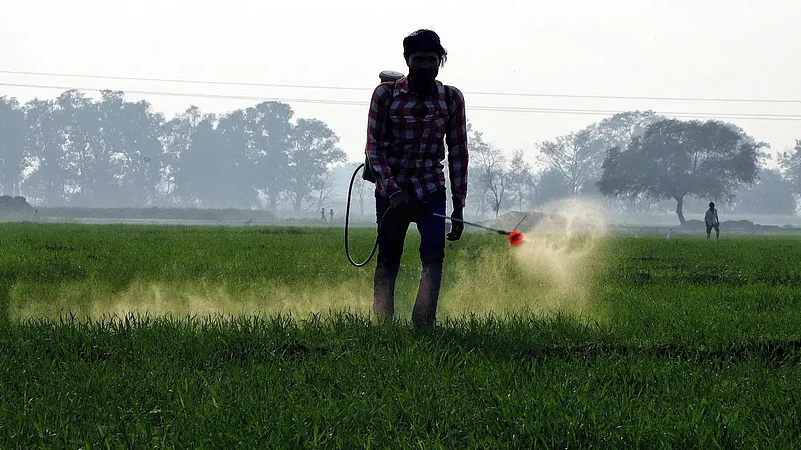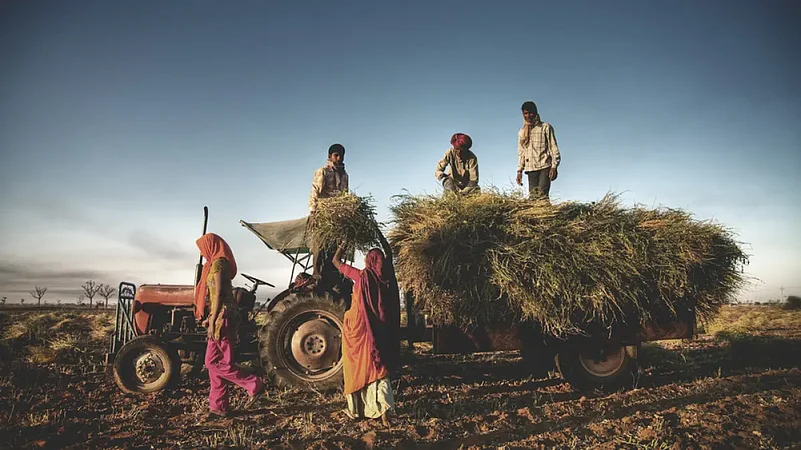South Asia is in the grip of unusually hot weather conditions. Soaring temperatures in the month of March have already reduced crop harvests in the north western regions of India. Given the severe climatic aberrations that were anticipated in the years to come, it seems the extreme weather conditions have already begun to play truant. Such hazardous weather conditions are likely to become more frequent.
While climate change is known to be fuelling extreme weather conditions globally, agriculture faces the heat. With the Intergovernmental Panel on Climate Change (IPCC) repeatedly warning of disastrous environmental consequences that await if agricultural business continues as usual, it is time to take a relook at the adverse consequences of industrial agriculture. While agriculture is a significant contributor to Green House Gas Emissions (GHGs), and industrial farming systems—right from deforestation to food wastage—plays a significant part, it is also at the receiving end, knowing the severe impact of climate change will be hard on the farming communities.
This is happening at a time when farmers globally have been protesting against the denial of a rightful income thereby pushing them deeper into the whirlwind of a severe agrarian crisis. Given the combination of worsening climate change on the one hand, and the growing farm distress on the other, agriculture is desperately crying for a change.
Green Revolution did bring in newer technology to increase crop production to fight global hunger, and it did that with quite impressive results. Intensive farming practices, in the process, added on to the environmental crisis. With soil fertility declining to almost zero; increased soil erosion expanding the spread of deserts; mining of underwater water sucking aquifers dry; and with chemical inputs contaminating the entire food chain, industrial agriculture has exacerbated environmental destruction. A three-year international collaborative study entitled ‘International Assessment of Agricultural Knowledge, Science and Technology for Development (IAASTD)’ released in 2008 had very clearly brought out that business as usual is not the way forward.

Considering that food and agriculture is the largest of the business enterprises, the opportunity to transform agriculture has been missed. But with climate change negotiations drawing focus on the impact—from agriculture, and for agriculture—the world is now beginning to realise the urgent need to produce food in a sustainable manner that leaves behind clean water, healthy soils, biodiversity and natural resources intact for the future generations. The lower the gas emissions from agriculture, the less will be the possibility of weather extremes destroying the ability to produce enough food.
It is therefore high time to move from the era of Green Revolution to a sustained period of an Evergreen Revolution. A term coined by Prof M.S. Swaminathan, the move towards Evergreen Revolution becomes absolutely necessary to feed the world in a sustainable manner, without inflicting any more damage to the already plundered but precious natural resources. An Evergreen Revolution also looks forward to a happy farmer, who is pulled out of a continuing cycle of debt and suicide, to finally emerge free and lead a life of dignity.
The iconic year-long protests by Indian farmers at the borders of New Delhi, and numerous other farmers’ protests across the globe over the last few years, have clearly shown that farmers are in crisis, essentially because agriculture has been deliberately kept impoverished. Farmers have been denied their rightful income, thereby making food commodities available cheap, and this is what has made the global agriculture supply chains competitive. But with the disruption in global food supplies arising after the Russian invasion of Ukraine, the world must learn a lesson not to be overly dependent on the supply chains and instead focus on the need to be food self-sufficient. Moving away from producing food surpluses that suit the capitalist farming systems, an Evergreen Revolution should bring back the emphasis on producing enough for everyone's needs and that too within the nation’s borders (as much as possible).

Considering that three billion people are suffering from micro-nutrient deficiency, and another 800 million go to bed hungry, nutritional security should be the hallmark of an Evergreen Revolution. Along with appropriate food system transformations, beginning with a slow but steady shift to agro-ecological farming systems, the world needs to bring in food and agricultural policies that draw out a renewed roadmap for the future.
For instance, as per a report, of the $700 billion of farm subsidies provided every year, only 1 per cent goes for environmental purposes. These subsidies must gradually shift for transforming the food systems, to ensure that the world is able to produce healthy food in a healthy environment. A study by the Rockefeller Foundation has established that the cost of producing cheap food is actually three times what the consumer pays. In other words, the real cost of producing cheap food has been very conveniently externalised. This has to change.
It is not something that is not doable. After all, the European Union has struck a deal to provide 20 per cent of the farm subsidies under the Common Agricultural Policy (CAP) for “eco-schemes” that protects the environment. Similarly, agriculture research needs to shift the focus with clearly-drawn out preamble to move away for chemical farming. More and more initiatives worldwide are in that direction, and that gives hope. Public policies too need to change in that direction.
The success of an Evergreen Revolution would depend on people’s participation. And it is here that the consumer plays a very important role. The more the consumer demands safe and healthy food, the more will be the market pressure on the farmers to change to an ecologically-safe farming system. Therein lies the future.





















